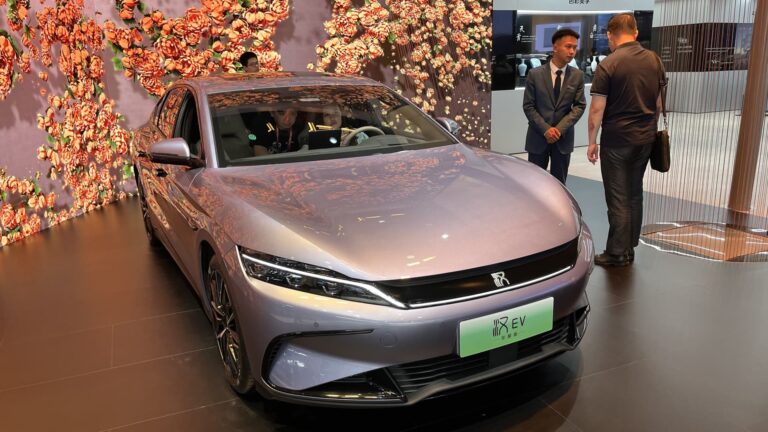Winning the electric car market in China is no longer just about lower prices. Despite the new U.S. tariffs, many industry insiders say China’s electric vehicle industry is already moving into a new phase where competition is no longer centered solely on sticker price. That’s good news for profit margins. But it also puts pressure on companies to make sure they invest in developing features that consumers want. And sometimes it’s as simple as installing a sunroof, making a profit for the glass manufacturer in the process. A survey conducted by JPMorgan last month found that more than 80% of Chinese consumers said they would prefer an electric car with a panoramic sunroof, and the majority would pay more than 600 yuan ($84.50) to purchase one. I don’t mind. Untapped Market The market is largely untapped when it comes to these vast panels. JPMorgan analysts in a report last week cited figures released by Fuyao Glass for late 2023, showing that only about 12 of the world’s cars, including conventional fuel vehicles, will have panoramic sunroofs. %. Fuyao, a major automotive glass supplier listed in Hong Kong, is one of JPMorgan’s top choices to take advantage of China’s growing electric vehicle market. According to the report, the panoramic sunroof will account for about 7% of Fuyao’s total revenue in 2023. In mid-April, JPMorgan and research partners surveyed more than 2,500 Chinese consumers who had recently purchased or were planning to purchase a new electric vehicle. JP Morgan said, “We believe that China’s EV competition has shifted from primarily focusing on price to now increasingly focusing on content.”And surprisingly, our “Our research shows that customers are willing to pay for content.” This is consistent with research by consulting firm Alix Partners that shows that consumers in the United States and Europe are more price-sensitive than Chinese consumers when it comes to purchasing electric vehicles. “I don’t interpret this to mean that Chinese consumers are not price sensitive,” said Stephen Dyer, co-leader of Greater China business and Asia leader for automotive and industrial at consulting firm AlixPartners. he said. In late April, he noted that Chinese consumers value technology features almost twice as much as U.S. respondents, adding, “There are literally hundreds of affordable options for Chinese consumers already. I interpret this to mean that it exists.The price is also reasonable.” That interest was on full display at the Beijing auto show late last month, where nearly every electric car manufacturer emphasized driver-assistance features and in-car entertainment. However, the core technology underlying electric vehicles remains the battery. About 70% of JPMorgan survey respondents said they were willing to pay a premium for their preferred battery brand, especially one that offered supercharging. “This is a plus for CATL as it is launching 1 to 1.5 years earlier than its competitors. [a] Analysts said it was an “ultra-fast charging battery.” Shenzhen-listed Chinese battery giant Contemporary Amperex Technology is one of the companies playing a top role in JPMorgan’s China electric vehicle supply chain. JPMorgan’s latest research shows a significant increase in respondents preferring hybrid cars over battery-powered cars this year, with around 44% of those surveyed preferring plug-in hybrids or cars with a fuel tank. I replied that I would buy it. According to JPMorgan, battery range will increase by 27% in 2023 and 24% in 2022, and when it comes to car brands, BYD has become the number one brand favored by consumers over the past three years. It is said that there is BYD produces both hybrid and battery-only vehicles, and is one of JPMorgan’s top players in this field. BYD has lost some brand recognition compared to last year’s performance, with new entrants trailing by a close second. Xiaomi, Huawei’s Aito brand, and Li followed. According to a report from JPMorgan, automobiles are one of the brands that has seen a significant increase in customer awareness. Tesla’s brand power has declined slightly. However, according to the survey, the Tesla Model 3 was the most desired battery-only car in the 200,000 yuan to 300,000 yuan price range. The majority of JPMorgan survey respondents budgeted at least 300,000 yuan for car purchases, with the 300,000 to 400,000 yuan range being the most popular. Last week, Chinese electric car company Nio released a new car priced at just over 200,000 yuan. His new Onvo L60 SUV is about $4,000 cheaper than Tesla’s Model Y, but slightly more expensive than Xiaomi’s new SU7 electric sedan. Nio CEO William Li told reporters on Thursday that the price war for EVs in China is almost over, with most of the price cuts already done. —CNBC’s Michael Bloom contributed to this report.

